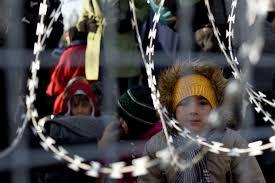
With the sudden increase of arrivals, hundreds more refugee and migrant children are becoming stranded in Greece with critical needs such as education and protection, says UNICEF.
More people arrived in the first three weeks of August than all of July 2016 (1,920 for July; 2,289 as of 24 August). This new influx comes at a time when Greece is struggling to cope with a strained welfare system due to the ongoing economic crisis, leaving refugee and migrant children facing a double crisis. In total, children make up nearly 40 per cent of the current stranded population.
“There is a real sense in Greece of refugee families just waiting – waiting for their asylum request to be processed, a decision to relocate elsewhere in Europe, waiting for proper schooling and playgrounds for their children, proper housing, simply waiting to know what their future will be,” said Laurent Chapuis, UNICEF’s Coordinator for the Refugee & Migrant response in Greece.
For children this waiting is an eternity - many from conflict torn countries like Syria, Afghanistan and Iraq have missed out entirely on education or lost years of schooling and are held back yet again.
“Education is a one of the most powerful ways to protect children from all forms of violence,” added Mr Chapuis. “This means we need to all join forces to boost Government’s efforts to get children back to school in September.”
Recent reports of sexual abuse, violence, and neglect are an indication of unsuitable living conditions and weakened child protection mechanisms. An overstretched public service has also compounded the risks for refugee and migrant children.
There are almost 27,500 children stranded in Greece and the number continues to rise. There are at least 2,250 unaccompanied children in Greece yet only a third stays in formal shelters. Despite the continued efforts of the Government and partners, the need for temporary accommodation, child protection services and schooling remain acute.
Getting children into education is a key priority for UNICEF and its partners in Greece, especially in the light of recent reports of children at risk. UNICEF has been supporting learning and recreational activities for refugee children in Skaramangas camp, near Athens, with the Greek NGO Piraeus Open School for Immigrants, as well as providing 11 container classrooms. UNICEF education programmes are being scaled up beyond Attica to other camps, targeting at least 5,000 children by the end of the year and working with the Ministry of Education to help integrate refugee children into the Greek education system.
Source: UNICEF
 FR
FR EN
EN AR
AR








